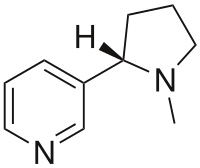
Photo from wikipedia
Glucocorticoids (GCs) are essential for maintaining energy homeostasis as part of the adaptive stress response. Most work to date has characterized the metabolic role of GCs via the activation of… Click to show full abstract
Glucocorticoids (GCs) are essential for maintaining energy homeostasis as part of the adaptive stress response. Most work to date has characterized the metabolic role of GCs via the activation of the glucocorticoid receptor (nr3c1; GR), which is activated under high GC conditions. However, GCs also bind to the mineralocorticoid receptor (nr3c2; MR), a high affinity corticosteroid receptor active under basal GC conditions. Despite the expression of MR in skeletal muscles, almost nothing is known about its physiological role. Here we tested the hypothesis that MR promotes anabolic processes during resting cortisol levels and curtails the catabolic actions of GR during high (stressed) levels of cortisol. To determine the effect of MR, a zebrafish line with a ubiquitous MR knockout (MRca402/ca402) was utilized. The GR was activated in the same group by chronically treating fish with exogenous cortisol. In the muscle, MR primarily promoted nutrient storage, and restricted energy substrate mobilization under resting condition, whereas GR activation resulted in increased nutrient utilization. Interestingly, a loss of MR improved GR-driven metabolic flexibility, suggesting that the activation state of these receptors is a key determinant of skeletal muscle ability to switch fuel sources. To determine if the anabolism-promoting nature of MR was due to an interaction with insulin, fish were co-injected with insulin and a fluorescent glucose analogue 2-NBDG. A loss of MR abolished insulin-stimulated glucose uptake in the skeletal muscle. Taken together, we postulate that MR acts as a key modulator of glucose metabolism in the musculature during basal and stress conditions.
Journal Title: Endocrinology
Year Published: 2022
Link to full text (if available)
Share on Social Media: Sign Up to like & get
recommendations!